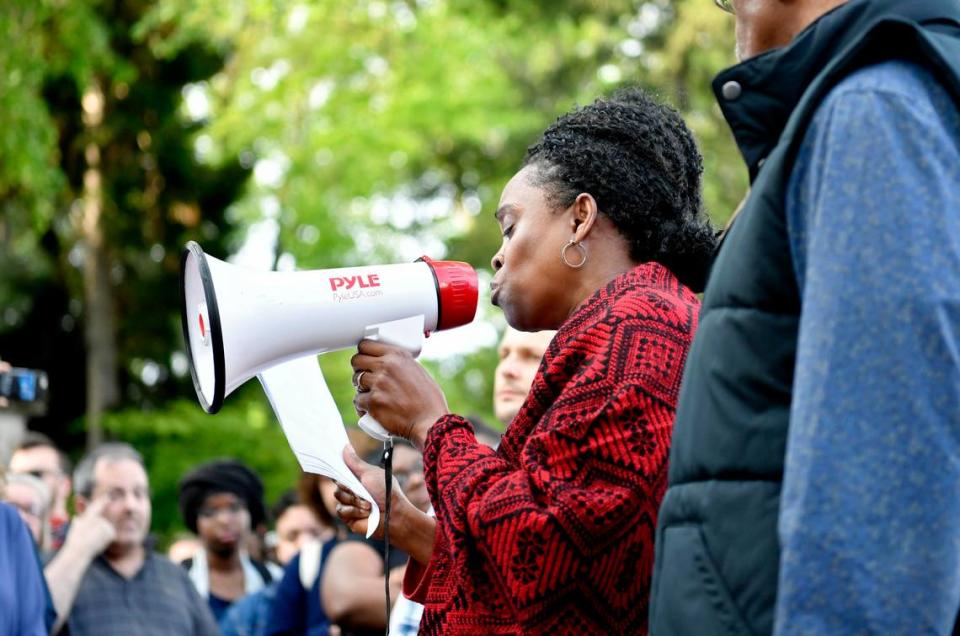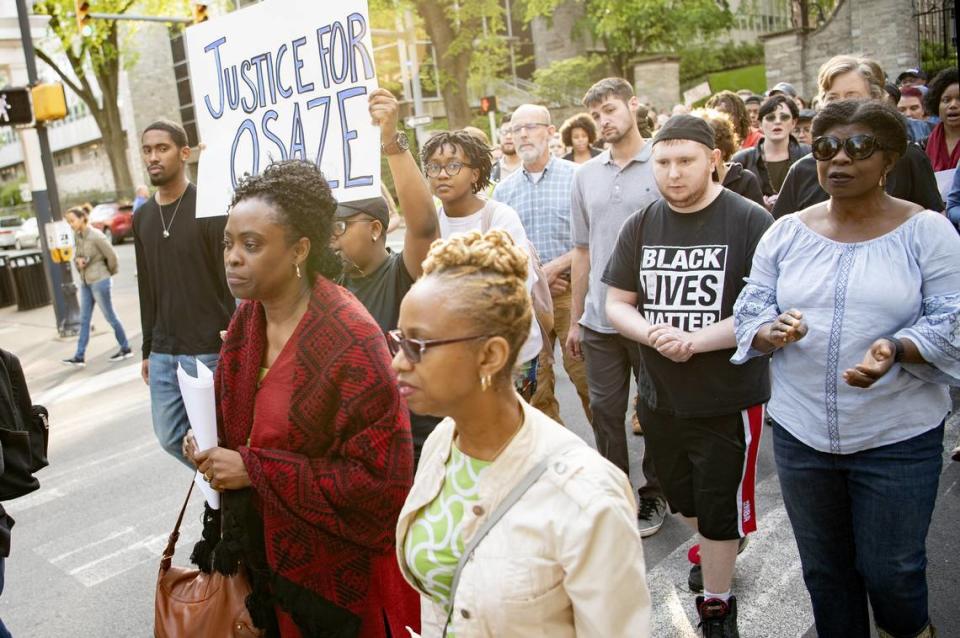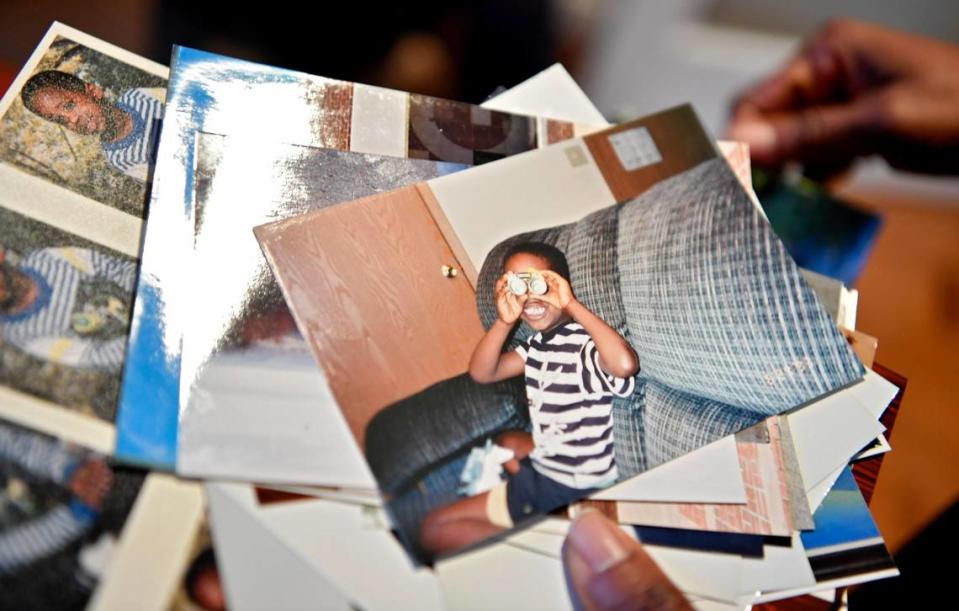‘Justice delayed is justice denied.’ Four years since the police killing of Osaze Osagie
Most Penn State students had not yet made it to University Park when Osaze Osagie was killed nearly four years ago by State College police, a reminder of how quickly things can turn over in the transient borough.
Yet as graduating classes come and go, what remains behind for those who call Happy Valley home is the legacy of the 29-year-old State College resident who’s been remembered as a loving child, brother, friend and devoted Christian.
Monday will mark four years since Osagie, a Black man who was experiencing a mental health crisis, was fatally shot by a white borough police officer.
“It is so vital that we do not forget; that we actively honor his memory with work and actions to ensure this never happens again,” 3/20 Coalition co-founder and Secretary Melanie Morrison said during a Borough Council meeting earlier this month. “This work is not always comfortable or pretty, but it is necessary.”
‘Determined to keep moving forward’
Sylvester Osagie called police for help because he was concerned his autistic son who had schizoaffective disorder — characterized by symptoms of both schizophrenia and bipolar affective disorder — stopped taking his medication.
Three officers were sent to his apartment along Old Boalsburg Road to involuntary transport him to the hospital. Osagie instead ran toward the officers inside a narrow hallway with a steak knife in his right hand.
A Taser was ineffective. He was shot three times, once in the shoulder and twice in the back. Fewer than 30 seconds passed from the time officers knocked on his door until the shooting. The department did not have body cameras at the time.
It was the first fatal police shooting in the department’s history. Many members of the community were outraged. Others, including Centre County District Attorney Bernie Cantorna, said the officer had no other option than to shoot in self-defense.
Iyun Osagie, when asked how her family is doing as they approach another somber anniversary, wrote they remain “resolute and determined to keep moving forward.”
“Justice should be fought for in the hearts of humanity. I also strongly believe that justice delayed is justice denied. I’ve been more concerned about the fragility of my children as we’ve all gone through the grieving process differently,” she wrote in a message to the Centre Daily Times. “Our lives have been turned upside down and delayed justice simply adds to our pain. My greatest concern now is to fight for my children to believe in themselves and in humanity in spite of all the trauma. Given our circumstances, our children’s healing would be the greatest accomplishment in my life as a mother.”
Adder her husband, Sylvester: “We are extremely grateful for the way the community continues to rally around us in support of causes we believe in.”
The family’s federal lawsuit against the borough and four officers — at least three of whom are no longer with the department — is pending more than two years after it was filed.

Attorneys are engaged in discovery, the formal process of exchanging information about witnesses and evidence that could be presented at trial. Several depositions are still pending, Osagie family attorney Andy Shubin said.
He’s hopeful a trial could begin by the end of the year. No formal dates have been set.
After a celebration of Osagie’s life last year, Shubin said the borough’s insurance company was unwilling to engage in potential settlement discussions with the family. When asked Thursday what — if anything — changed in the past year, Shubin said “I’d rather not respond to that.”
“Both parties appear to be preparing for trial at this point,” Shubin said. “That is the assumption that my clients are operating under.”
State College Mayor Ezra Nanes and Borough Council President Jesse Barlow wrote they are unable to comment on anything related to the lawsuit.
State College paid a one-time $25,000 insurance deductible to defend itself and the officers against the lawsuit, borough spokeswoman Kayla Lafferty wrote in an email. The money came from the borough’s general fund, one that accounts for the general operations of government paid with taxes and other fees.

Two attorneys not associated with the lawsuit — Brian Zeiger and Frank Walker — said it is not uncommon for civil rights lawsuits to remain unresolved more than 28 months after it was first filed.
“It’s literally like scheduling a family reunion or a wedding, a huge event. You have to get all these schedules together, and not only those schedules. You got to think about the kids of those parents’ schedules. ‘Can they come to this deposition for X, Y and Z?’ You give them four dates. All of the sudden, someone gets sick. ‘Can I do it on Zoom?’ ‘No, we’d rather do it in person.’ ‘OK, we got to reschedule.’ Then there’s documents that need to be retrieved and there’s standing deadlines there,” Walker said. “So there’s a lot of give-and-take on both sides because you want to make sure you get all the information that is needed for both sides to either A) settle the case or B) take the case to trial.”
What has changed in the past four years?
Calls for change followed almost immediately after Osagie’s killing. Progress has been made in some areas, while other recommendations have lingered.
The police department hired a social worker to join officers serving involuntary mental health warrants, a program former Centre County Commissioner Michael Pipe described as “pioneering for our area.”
The borough also created the Community Oversight Board, a civilian board that oversees — but is not authorized to conduct any investigation of — the police. Borough police Chief John Gardner termed the board’s first meeting a “watershed moment for our community.”
The International Association of Chiefs of Police was hired by the borough in October 2019 to review the police department’s policies and practices. A 72-page report released in July 2020 included nearly four dozen recommendations.
About three out of every four have been implemented, according to the department’s online dashboard.
A mental health task force issued its own 79-page report four months later. Implementation of those recommendations has been slow. Only one-third are in effect.
“Temperatures have cooled and most have sunk back into complacency,” the 3/20 Coalition wrote in a statement. “We continue to assert that justice has yet to be served and that not enough has changed in the borough, city, nor county to prevent this happening again.”
Advocates for racial and social justice planned at least two events to honor Osagie.
A protest and march to his apartment was planned to begin noon Sunday at the State College Municipal Building. A candlelight vigil is scheduled for 7 p.m. Monday at the Martin Luther King Jr. Plaza.
“Osaze should still be here today and what happened to him on March 20 was entirely preventable and ultimately unforgivable,” the coalition wrote. “We must keep his name and his story fresh on our tongues and continue to urge others to join the fight for justice, substantive change and long-term reforms.”


